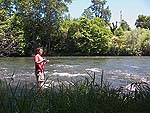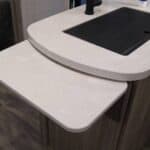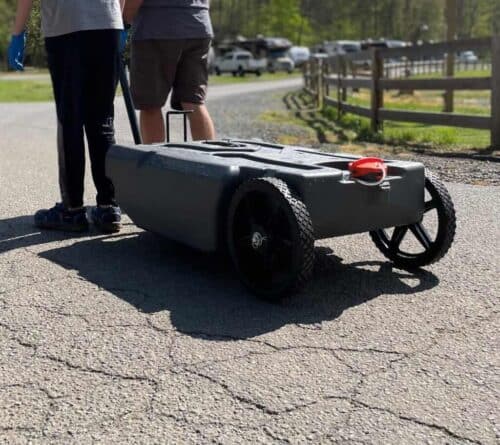Those of us who choose a [an error occurred while processing this directive] trailer will wonder at some point if there is an alternative to the hitch taking up most of the truck bed. One option commonly considered is a fifth wheel gooseneck adapter, which requires only a vertically mounted ball hitch in the bed of the truck.
I have also considered this option, especially since our Ford truck came with a ball hitch welded onto the [an error occurred while processing this directive]. In this article I summarize my findings and the conclusions I’ve drawn based on my research.
What is a Fifth Wheel Gooseneck Adapter?
A gooseneck adapter is a device that attaches to the fifth wheel trailer’s [an error occurred while processing this directive] and extends it down about two feet, allowing it to couple with a vertically mounted ball hitch.
Essentially the adapter converts a fifth wheel trailer to a [an error occurred while processing this directive] trailer.
Advantages of a Fifth Wheel Gooseneck Adapter
If you have ever seen a fifth wheel hitch taking up most of a truck’s bed, then the primary benefit is obvious—to free up the bed. The gooseneck adapter offers these benefits:
- Empty Truck Bed: The primary reason for people to consider the gooseneck adapter is to free up the bed. A ball hitch takes up much less space than a fifth wheel hitch. If a perfectly flat bed is desired, numerous removable, folding, or pop-up ball hitches are available on the market.
- Cost Savings: Installing a ball hitch is less expensive than a fifth wheel hitch. Cost was my second top consideration because our Ford truck came with a ball hitch. Even after paying for a gooseneck adapter, the savings was $1,000. (Not all fifth wheel hitch installations are so expensive. Our Ford truck required additional modifications to the hauler back to fit the hitch.)
- Easier Hitching: Users of gooseneck adapters find it easier to hitch up and disconnect on uneven ground. Since the gooseneck adapter comes straight down onto the ball, hitching can be accomplished even when the truck and trailer are at significant angles from each other. In similar scenarios a fifth wheel hitch may bind if the angle is too great, though a four way pivoting hitch makes this less of a problem.
- Less Weight: A heavy duty gooseneck hitch and adapter weighs less than a similarly heavy fifth wheel hitch, leaving more capacity for cargo and towing. The difference is not significant, but even small amounts help when the weight is approaching maximum truck ratings.
- Tow Gooseneck & Fifth Wheel: The same truck can tow gooseneck trailers, such as horse and cargo, as well as adapted fifth wheel trailers.
Disadvantages of a Fifth Wheel Gooseneck Adapter
Having considered all of the wonderful benefits, I wanted to rush out and buy an adapter. I tempered my excitement long enough to look at the potential disadvantages.
All of the disadvantages stem from an undeniable fact of physics—installing the adapter extends the hitch downward about two feet, increasing the amount of torque placed on the trailer frame. The additional torque brings the following potential problems:
- May Damage Frame: The additional torque caused by the adapter may flex the frame beyond its design limitations, potentially damaging it.
- May Damage Walls and Windows: Even if the frame can withstand the extra flexing, walls may not fare as well, causing windows to pop out and walls to crack.
- May Void Warranty: From my conversations with dealers and manufacturers, I got the feeling that very little, if any, testing has been done with gooseneck adapters. Therefore, they may play it safe and void the warranty if an adapter is installed.
Is an Adapter Right for You?
Now that the advantages and disadvantages have been laid out, how do you decide if an adapter is right for your specific trailer? Before spending time on researching the adapters, I urge you to call the fifth wheel manufacturer for their advice. Ask to speak with a structural engineer and solicit their opinion on how the adapter would affect the trailer. If you receive a go-ahead from the engineering staff, it would be wise to also talk with the service department about warranty issues.
Then, talk to your local [an error occurred while processing this directive] dealer and see how they feel about warranty repairs after an adapter has been installed. Even if the manufacturer gave you the green light, you will have to work with the dealer for warranty repairs. If you receive a negative response, check with other dealers in the area who can service your trailer. A positive response should be easier to get from a dealer that sells the adapter.
If the manufacturer and dealer are hesitant to approve the adapter, you have to decide if you are willing to take on the monetary risks associated with the down-sides.
My Decision
First, a few details about our fifth wheel to put my decision in context:
 Ford F-550 with ball hitch installed on hauler back for gooseneck towing.
Ford F-550 with ball hitch installed on hauler back for gooseneck towing.
- 2003 Royalite by King of the Road
- External length: 36′ 6″
- Actual trailer weight upon delivery: 16,100 lbs
After consider the pros and cons, I decided not to use the gooseneck adapter. This decision was primarily based on my phone conversation with a King of the Road engineer. He gave me what seemed to be his honest opinion about the adapter.
The engineer felt confident that the adapter would cause no frame damage and had no reservations recommending it for some trailer models. However, the sticking point for our model was the bedroom [an error occurred while processing this directive] near the front.
 Fifth wheel hitch installed, after deciding against the gooseneck adapter.
Fifth wheel hitch installed, after deciding against the gooseneck adapter.
According to the engineer, the frame was strong enough to withstand the additional torque, but it would flex more with the adapter installed. Having the slide so close to the hitch made it likely that windows would pop out and walls crack during aggressive acceleration and deceleration. In the end, an empty truck bed and an extra $1,000 in my pocket were not strong enough reasons to go against the advice of the folks who designed the trailer.
Please do not assume from my decision that trailers shorter than 36′ 6″ without a front slide are automatically candidates for an adapter. The main point of this article is that you need to check with the fifth wheel manufacturer before deciding on a gooseneck adapter.
Original founder and writer for Changin' Gears. Former full-time RVer!
-
Charlie Kerekeshttps://changingears.com/author/charlie-kerekes/
-
Charlie Kerekeshttps://changingears.com/author/charlie-kerekes/
-
Charlie Kerekeshttps://changingears.com/author/charlie-kerekes/
-
Charlie Kerekeshttps://changingears.com/author/charlie-kerekes/










